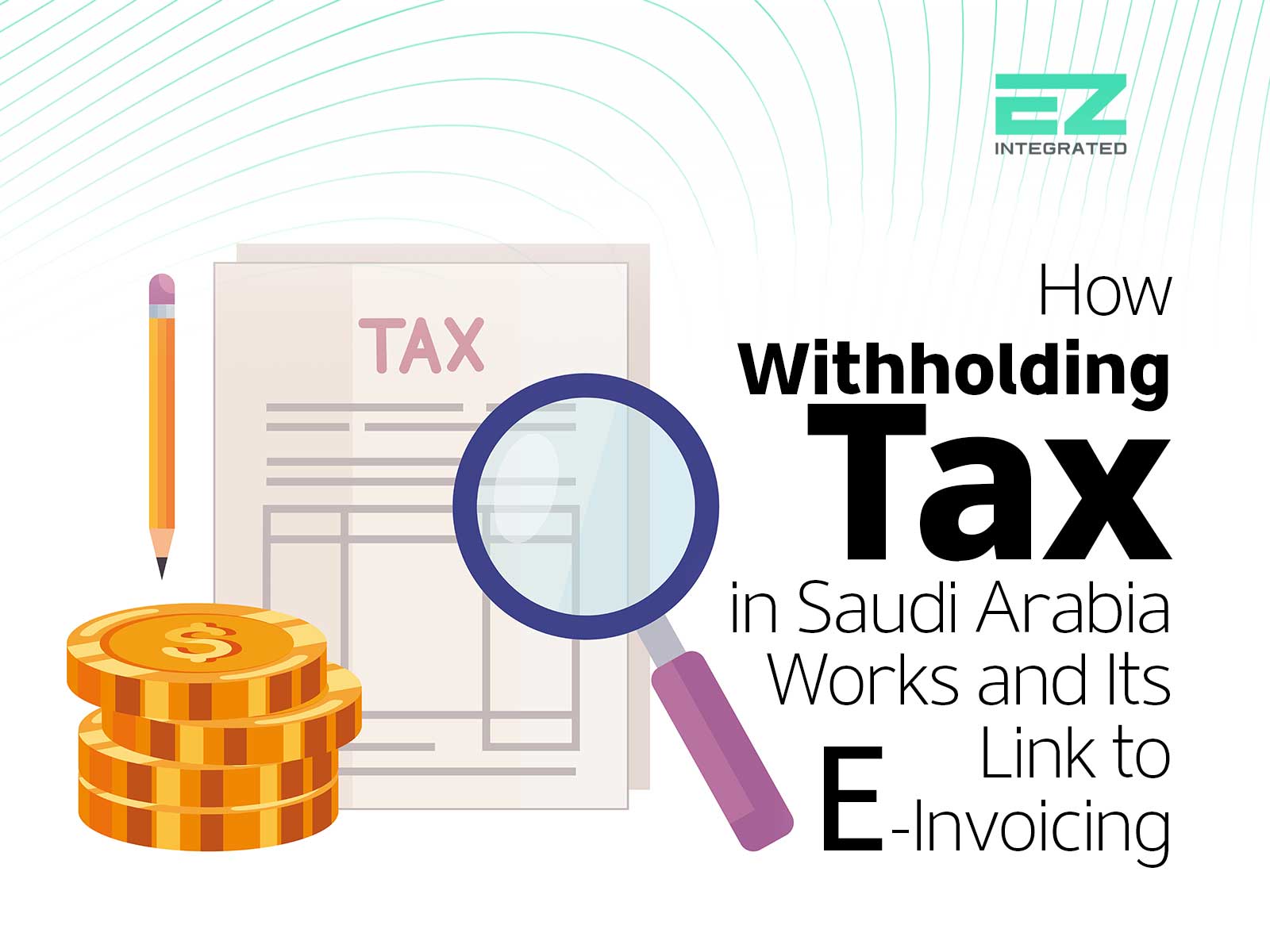The withholding tax in Saudi Arabia is one of the main tools that ensures taxes are collected from income generated within the Kingdom by non-residents. It also strengthens financial transparency across all sectors.
This article explains how the withholding tax works, who it applies to, and how e-invoicing helps companies remain fully compliant.
What Is Withholding Tax in Saudi Arabia?
The withholding tax in Saudi Arabia applies to any amount paid by a resident entity to a non-resident for services or income generated within the Kingdom.
The resident party is responsible for deducting the tax from the total payment before transferring it to the foreign entity. The deducted amount must then be submitted to the Zakat, Tax, and Customs Authority within the legal timeframe.
This process ensures that the tax is collected even if the service provider operates from outside the country.
Who Is Subject to Withholding Tax in Saudi Arabia?
The withholding tax in Saudi Arabia applies to any non-resident individual or company that earns income from a source within the Kingdom. The resident payer, whether an individual or a company, is legally required to deduct and remit the tax.
Common examples include contracting with foreign firms for consulting or technical services, paying returns to foreign investors, or using software licenses provided by non-resident entities.
Types of Income Subject to Withholding Tax
There are several types of payments covered under the withholding tax in Saudi Arabia, provided the income source is within the Kingdom. The most common include:
- Technical, management, or consultancy fees.
- Royalties and intellectual property rights, including trademarks.
- Interest on loans and financing arrangements.
- Dividends and returns paid to non-resident investors.
- Equipment leasing and international shipping or logistics services.
Withholding Tax Rates in Saudi Arabia
The Zakat, Tax, and Customs Authority sets the applicable rates for the withholding tax in Saudi Arabia according to the nature of the income. Typically, the rate is 5% for technical or consulting services, 15% for royalties and intellectual property, and 20% for management fees.
These rates may be reduced or exempted if there are double taxation treaties between Saudi Arabia and other countries, provided that the necessary documentation is submitted and approved.
Double Taxation Agreements and Withholding Tax in Saudi Arabia
Saudi Arabia has signed several international agreements to prevent double taxation. These agreements may reduce or eliminate the withholding tax in Saudi Arabia for certain types of income.
Such measures help protect foreign investments and create a transparent, stable business environment in the Kingdom. To benefit from these agreements, a valid tax residency certificate must be presented and approved by the Zakat, Tax, and Customs Authority.
How the Withholding Tax in Saudi Arabia Works
The withholding tax in Saudi Arabia takes effect from the moment an invoice is issued. Companies must follow specific steps to document and remit the amounts accurately:
- Confirm whether the service or income is subject to tax.
- Deduct the applicable percentage before making payment.
- Issue a certified invoice or notice that includes all details of the deduction.
- Remit the withheld amount to the Authority within ten days after the end of the month.
- Submit an annual report listing all deducted and remitted amounts.
Proper documentation and timely reporting are key to avoiding penalties or compliance issues.
The Link Between Withholding Tax and E-Invoicing
In its second phase, the E-Invoicing system has become essential for tax compliance in the Kingdom. It helps manage the withholding tax in Saudi Arabia by:
- Recording payments and deductions in electronic invoices approved by the Authority.
- Storing non-resident information for future audits.
- Reducing calculation and reporting errors.
- Generating digital reports that help businesses monitor their tax obligations.
E-invoicing has turned tax compliance into an automated process, replacing manual verification with instant digital accuracy.
Business Obligations and Potential Risks
Resident businesses are fully responsible for complying with the withholding tax in Saudi Arabia. They must deduct the tax at the correct time, remit it within the legal deadline, and record the transaction in their e-invoicing system.
Any delay or miscalculation can result in financial penalties. Therefore, companies are advised to use integrated financial systems that manage invoicing and withholding tax simultaneously. Compliance not only prevents fines but also enhances the company’s financial credibility and transparency.
How EZ Integrated Helps Businesses Stay Compliant
During the second phase of Saudi Arabia’s E-Invoicing rollout, technical integration with the FATOORA platform has become a key requirement for ongoing compliance.
EZ Integrated, an authorized technology provider, specializes in linking accounting systems and point-of-sale solutions with the FATOORA platform to achieve seamless and secure connectivity. We help businesses by:
- Connecting accounting or POS systems directly with the FATOORA portal.
- Digitally documenting invoices and withholding tax transactions in real time.
- Generating automated reports to track tax remittance to the Authority.
- Ensuring full compliance with the second phase of E-Invoicing regulations.
For more details or to request a consultation, contact EZ Integrated today and discover how smart integration can simplify your tax and invoicing compliance.
